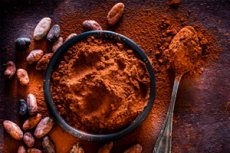New publications
Cocoa flavanols may protect the vascular system from stress
Last reviewed: 02.07.2025

All iLive content is medically reviewed or fact checked to ensure as much factual accuracy as possible.
We have strict sourcing guidelines and only link to reputable media sites, academic research institutions and, whenever possible, medically peer reviewed studies. Note that the numbers in parentheses ([1], [2], etc.) are clickable links to these studies.
If you feel that any of our content is inaccurate, out-of-date, or otherwise questionable, please select it and press Ctrl + Enter.

A new study has found that a high-flavanol drink made from cocoa may protect the body's vascular system from stress, even after eating a fatty meal.
The food choices you make during times of stress can influence its impact on your cardiovascular system. For example, a recent study from the University of Birmingham found that fatty foods can negatively impact vascular function and oxygen delivery to the brain, while flavanol compounds, found in abundance in cocoa and green tea, can protect vascular function during times of everyday stress.
Now, in a new study, the same team of scientists has found that consuming high-flavanol cocoa with a fatty meal can counteract some of the effects of fatty food consumption and protect the vascular system from stress.
The study was published in the journal Food and Function.
Dr Catarina Rendeiro, assistant professor of nutritional sciences at the University of Birmingham and lead author of the study, said: "We know that when people are stressed, they tend to reach for fatty foods. We have previously shown that fatty foods can impair vascular recovery after stress. In this study, we wanted to find out whether adding a high-flavanol food to a fatty meal could mitigate the negative impact of stress on the body."
Rosalind Baynham, first author of the paper, explained: "Flavanols are compounds found in a variety of fruits, vegetables, teas and nuts, including berries and raw cocoa. Flavanols are known to have health benefits, particularly in regulating blood pressure and protecting the cardiovascular system."
In the study, a group of healthy young adults were given a breakfast consisting of two puff pastry croissants with 10g of salted butter, 1.5 slices of cheddar cheese and 250ml of whole milk, and either a high-flavanol or low-flavanol cocoa drink. After a rest period, the participants were given a mental arithmetic test that became more difficult every eight minutes and required concentration. During the eight-minute rest and test period, the researchers measured forearm blood flow, cardiovascular activity and tissue oxygenation in the prefrontal cortex (PFC). They also assessed vascular function using brachial artery flow-controlled dilation (FMD), a predictor of cardiovascular disease risk.
Cocoa drinks were prepared by dissolving 12 g cocoa powder in 250 ml whole milk. The low-flavanol powder was treated by alkalization to reduce the total flavanols to 5.6 mg per serving; the high-flavanol powder was untreated, containing 695.0 mg flavanols per serving. Alkalization is a process commonly used in chocolate making to enhance flavor, but unfortunately reduces the flavanol content.
The team confirmed that consuming a high-fat meal with a low-flavanol drink during a stressful situation reduced vascular function (by 1.29% FMD) and this effect persisted for up to 90 minutes after the stressful event. The results also showed that the high-flavanol drink was effective in preventing the decline in vascular function following stress and high-fat meal consumption. Brachial artery dilation was significantly greater after consuming high-flavanol cocoa compared to a low-flavanol drink at 30 and 90 minutes after the stressful period. Previously, the scientists found that a high-fat meal reduces brain oxygenation in the prefrontal cortex during stress, but cocoa flavanols did not improve brain oxygenation or affect mood.
This study shows that eating foods high in flavanols may be a strategy to mitigate the impact of poor diet on the vascular system. This will help us make more informed decisions about what to eat and drink during stressful periods," said Dr. Catarina Rendeiro.
When shopping at the supermarket, look for minimally processed cocoa powder, and if cocoa isn’t your cup of tea, there are other ways to get more flavanols, including green tea, black tea, and berries. Recently published guidelines for flavanol intake recommend 400–600 mg/day, which you can get by drinking two cups of black or green tea or by combining berries, apples, and quality cocoa.
Jet Veldhuysen van Zanten, professor of biological psychology at the University of Birmingham and co-author of the paper, added: "Modern life is stressful and its impact on our health and economy is well documented, so any changes that can protect us from stress symptoms are important. For those who are used to turning to comfort food when stressed, or choosing convenience foods when busy or under time pressure, these small changes can have a real impact."
